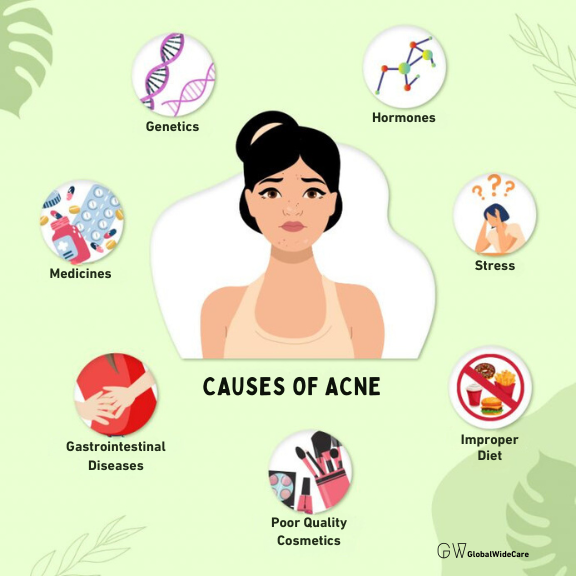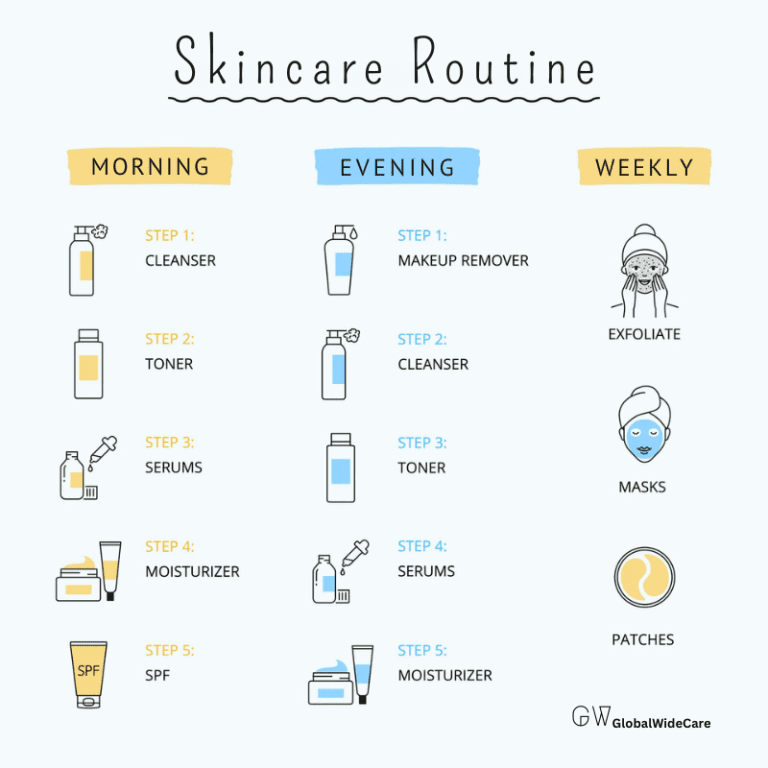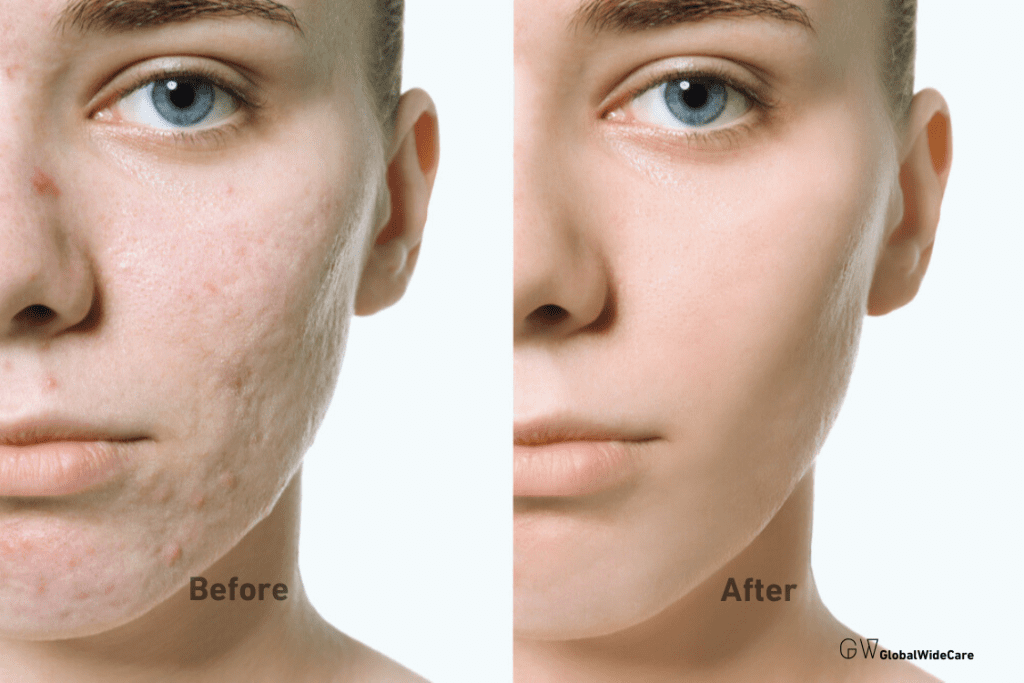Acne is more than just a skin condition; it’s a battle that millions face daily, affecting not only their appearance but also their confidence and overall well-being. If you’ve ever felt like your skin is in constant revolt, you’re not alone. But fear not—this comprehensive guide is here to help you understand, tackle, and ultimately conquer facial spots. Discover the secrets to achieving clear, radiant skin and reclaiming your confidence with these expert-backed strategies.
What Causes Acne?
Understanding the root causes of facial spots is essential for effective treatment. Acne is often triggered by a combination of factors:
- Hormonal Changes: Fluctuations, particularly during puberty, menstruation, or pregnancy, can significantly impact oil production, leading to clogged pores.
- Excess Oil Production: Overactive sebaceous glands can exacerbate this issue by producing too much oil, creating a breeding ground for bacteria.
- Clogged Pores: Dead skin cells, sebum, and bacteria can block pores, leading to inflammation and breakouts.
- Bacteria: Propionibacterium acnes is a bacteria that thrives in clogged pores and contributes to facial spots.
- Diet and Lifestyle: Consuming high-glycemic foods, dairy, and experiencing stress can further aggravate facial spots.
Addressing these factors holistically is crucial for achieving clearer skin. To effectively manage facial spots, it’s important to adopt a skincare routine that targets these underlying causes while also making lifestyle adjustments.

Expert-Approved Acne Treatment Strategies
Battling facial spots can be daunting, but with the right approach, clear skin is within reach. Here are ten powerful strategies to help you achieve and maintain a blemish-free complexion:
Adopt a Consistent Skincare Routine
- Cleanse Daily: Use a gentle, non-comedogenic cleanser twice daily to remove dirt, oil, and impurities. Opt for products with ingredients like salicylic acid or benzoyl peroxide for enhanced effectiveness.
- Exfoliate Regularly: Exfoliate 2-3 times a week to remove dead skin cells that can clog pores. Chemical exfoliants with alpha hydroxy acids (AHAs) or beta hydroxy acids (BHAs) are ideal for treating acne-prone skin.
- Moisturize: Even oily skin needs hydration. Choose a lightweight, oil-free moisturizer that won’t clog pores. Ingredients like hyaluronic acid can help maintain moisture without adding excess oil.
Incorporate Acne-Fighting Ingredients
- Salicylic Acid: This beta hydroxy acid helps exfoliate the skin and unclog pores. It’s particularly effective for treating blackheads and whiteheads.
- Benzoyl Peroxide: Known for its antibacterial properties, it helps reduce acne-causing bacteria and decrease inflammation. Use products with 2.5% to 5% benzoyl peroxide to start, as higher concentrations can be too harsh.
- Retinoids: These derivatives of vitamin A promote cell turnover and prevent clogged pores. They can also help reduce the appearance of facial spots scars over time.
Maintain a Healthy Diet
- Reduce Sugar and Dairy: High-sugar and dairy diets have been linked to increased acne severity. Opt for low-glycemic index foods and consider reducing dairy intake to see if it improves your skin.
- Increase Antioxidants: Foods rich in antioxidants, such as fruits and vegetables, can help reduce inflammation and promote healthier skin. Berries, leafy greens, and nuts are excellent choices.
- Stay Hydrated: Drinking plenty of water helps keep your skin hydrated and flushes out toxins. Aim for at least eight glasses of water a day to support overall skin health.
Avoid Touching Your Face
- Prevent Transfer of Bacteria: Your hands carry bacteria and oils that can exacerbate facial spots. Avoid touching your face to minimize the risk of spreading germs.
- Minimize Picking and Squeezing: This can lead to scarring and further inflammation. Use gentle methods to treat breakouts and avoid the temptation to pick at blemishes.
Use Non-Comedogenic Products
- Choose Makeup Wisely: Opt for makeup labeled as non-comedogenic to avoid clogging pores. Look for products designed specifically for acne-prone skin.
- Check Ingredients: Avoid products with heavy oils or fragrances that can irritate the skin. Stick to products with simple, clean formulations that won’t exacerbate acne.






6. Manage Stress
- Practice Relaxation Techniques: Stress can trigger or worsen facial spots, so techniques like meditation, deep breathing, or yoga can be beneficial. Regular relaxation practices can help manage stress levels.
- Prioritize Self-Care: Ensure you’re getting enough sleep and managing stress effectively. Adequate rest and a balanced lifestyle contribute to healthier skin.
7. Seek Professional Help
- Consult a Dermatologist: For persistent or severe acne, a dermatologist can provide personalized treatment options. They may recommend prescription medications or advanced treatments like chemical peels or laser therapy.
- Consider Prescription Medications: Options like oral antibiotics or hormonal treatments may be necessary for more severe cases. A dermatologist can guide you in choosing the best treatment plan for your needs.
8. Explore Natural Remedies
- Tea Tree Oil: Known for its antibacterial properties, it can help reduce acne inflammation. Dilute tea tree oil with a carrier oil and apply it to affected areas.
- Green Tea Extract: Contains antioxidants that can help soothe and heal the skin. Look for skincare products with green tea extract or apply cooled green tea bags to the skin.
9. Be Patient and Persistent
- Allow Time for Treatments: facial spots treatments can take several weeks to show results, so be patient. Consistency is key in seeing improvements in your skin condition.
- Stick to Your Routine: Adhering to your skincare routine and treatment plan is essential for long-term success. Avoid switching products frequently, as this can disrupt your skin’s balance.
10. Consider Lifestyle Changes
- Regular Exercise: Helps reduce stress and improves circulation, contributing to healthier skin. Aim for at least 30 minutes of moderate exercise most days of the week.
- Avoid Excessive Sun Exposure: While some sunlight can be beneficial, too much can irritate and damage the skin. Use sunscreen with SPF 30 or higher to protect your skin.
Conclusion
Acne can be a frustrating and persistent challenge, but with a comprehensive approach and the right strategies, you can achieve clear, healthy skin. By understanding the causes of facial spots and incorporating expert-recommended treatments into your daily routine, you are taking significant steps towards a blemish-free complexion. Remember, effective facial spots management requires patience and consistency. Embrace these powerful strategies, and you’ll be well on your way to transforming your skin and boosting your confidence. Celebrate every small victory along the journey and stay committed to your skincare routine. Clear, radiant skin is not just a dream—it’s an achievable reality.
Additional Resources
For more detailed information and additional support, check out these valuable resources: